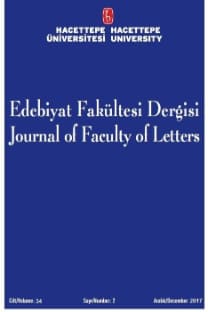At the Interface of two Different Linguistic Aesthetics: Chinua Achebe’s Things Fall Apart and Arrow of God
İki Ayrı Dilbilimsel Estetiğin Arasında Chinua Achebe’nin İki Romanı: Parçalanma ve Tanrının Oku
___
- Achebe, C. (1969 [1964]). Arrow of God. New York: Anchor Books.
- Achebe, C. (1975). ‘The African writer and the English language’, C. Achebe, Morning Yet On Creation Day.London: Heinemann [first published as C. Achebe (1965). ‘English and the African writer’, Transition, 18:27-30].
- Achebe, C. (1988). Hopes and Impediments. Selected Essays 1965-87. London: Heinemann.
- Achebe, C. (2001 [1958]). Things Fall Apart. London: Penguin.
- Adejare, O. (1998). ‘Translation: A Distinctive Feature of African Literature in English’, E.L. Epstein and R. Kole(Eds), The Language of African Literature, Trenton/Asmara: Africa World Press.
- Akoma, C. (2004). ‘Verbal Abundance: The Contexts of Igbo Speech Acts in No Longer at Ease’, E. N. Emenyonu(Ed.), Emerging Perspectives on Chinua Achebe: Vol. I. Omenka: The Master Artist, Trenton/Asmara:Africa World Press.
- Gikandi, S. (1991). Reading Chinua Achebe: Language and Ideology in Fiction. London: James Currey.
- Janmohamed, A. (1998). ‘Sophisticated Primitivism: The Syncretism of Oral and Literate Modes in Achebe’sThings Fall Apart’, S. Iyasere (Ed.), Understanding Things Fall Apart: SelectedEssays and Criticism, Troy,New York: Whitston Publishing.
- McCarthy, B. E. (1998). ‘Rhythm and Narrative Method in Achebe’s Things Fall Apart’, S. Iyasere (Ed.),Understanding Things Fall Apart: Selected Essays and Criticism, Troy, New York: Whitston Publishing.
- Ngara, E. (1982). Stylistic Criticism and the African Novel. London: Heinemann.
- Ngugi wa Thiong’o (1986). Decolonizing the Mind. The Politics of Language in African Literature, London: James Currey.
- Obiechina, E. (1972). ‘The Problem of Language in African Writing: the Example of the Novel’. The Conch,5(1&2): 11-29.
- Obiechina, E. (1975). Culture, Tradition and Society in the West African Novel. Cambridge: Cambridge UniversityPress.
- Ong, W. J. (2002). Orality & Literacy. The Technologizing of the Word (2nd edition). London: Routledge.
- Shelton, A. J. (1969). ‘The “Palm Oil” of Language: Proverbs in Chinua Achebe’s Novels’. Modern LanguageQuarterly, 30(1): 86-111.
- Turkington, K. (1977). Chinua Achebe: Things Fall Apart. London: Edward Arnold.
- Wali, Obi (1963), ‘The dead end of African literature?’. Transition, 10: 13-15.
- Wasserman, J. N. (1998). ‘The Sphinx and the Rough Beast: Linguistic Struggle in Chinua Achebe’s Things FallApart’, S. Iyasere (Ed.), Understanding Things Fall Apart: Selected Essays and Criticism, Troy, New York:Whitston Publishing.
- Zabus, C. (1991). The African Palimpsest: Indigenization of Language in the West African Europhone Novel.Cross/Cultures 4. Amsterdam: Rodopi.
- ISSN: 1301-5737
- Yayın Aralığı: 2
- Başlangıç: 1983
- Yayıncı: Emine Erdoğan Özünlü
Calque in Diplomatic Condolence Messages: The Case of Reina Terrorist Attack
Reading The Penelopiad through Irigaray: Rewriting Female Subjectivity
Becoming Jane: the Romanticisation of Celebrity
Farklı Eğitim ve Kültürlerdeki Üniversite Öğrencilerinin İntihale İlişkin Görüş ve Davranışları
Yurdagül ÜNAL, Nazan ÖZENÇ UÇAK
Refik Halit Karay’ın “Yatık Emine”sinde Görülen ama Göremeyen
Christoph Ransmayr’ın Son Dünya Romanında Büyülü Gerçekçilik
Derya SARIŞIK, Ezgi DUMAN KAYA
Parmak Ucunda Bir Yazı: Acının Arsız Yokluğuyla Siyah Kuğu’yu Çözümlemek
Anadili Türkçe Olan 4-8 Yaş Grubu Çocuklarda Konuşma Akıcısızlığının İncelenmesi
Gülmira KURUOĞLU, Ayşe ALTIPARMAK
